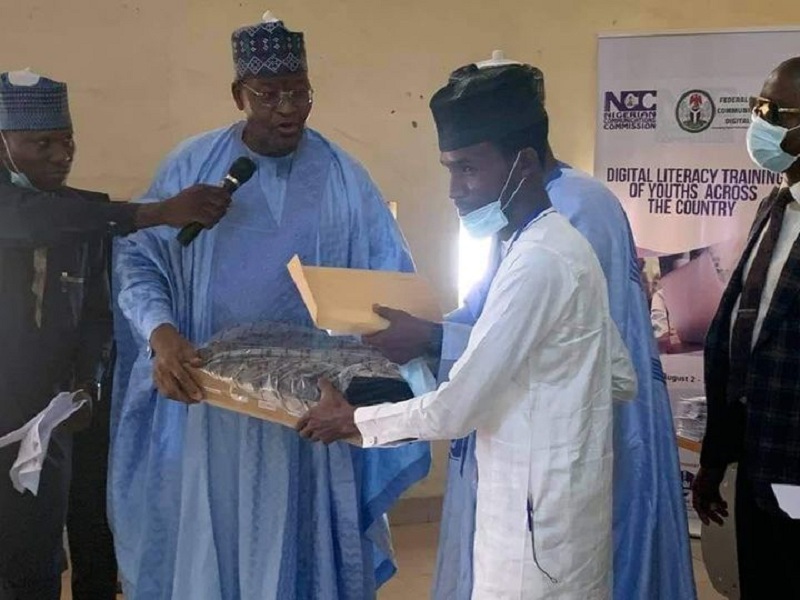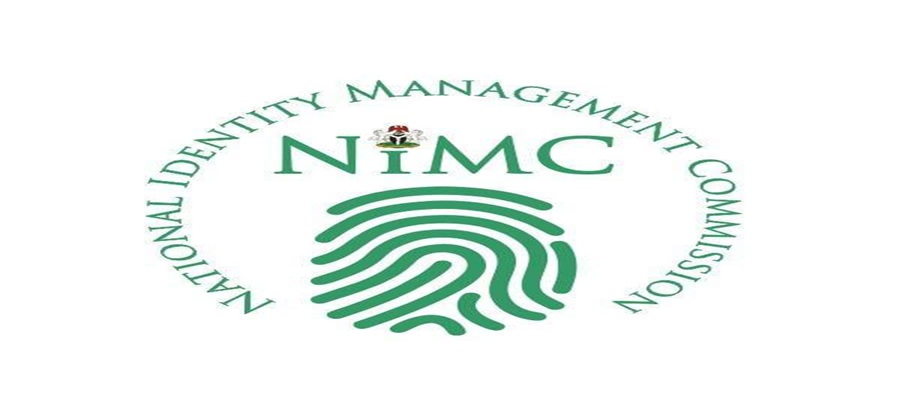Telecom
Digital Literacy Training: Danbatta Charges Nigerian Youths on Skills Application

Prof Umar Garba Danbatta, executive vice chairman of the Nigerian Communications Commission (NCC), has charged the Nigerian youths, who participated in the nationwide digital literacy training conducted by the Commission, to put the skills acquired as well as the Information and Communication Technology (ICT) tools received during the exercise to appropriate and legitimate use.

Executive Vice Chairman, NCC, Prof. Umar Garba Danbatta, presenting a certificate and laptop to a participant of Digital Literacy Training of Youths across the country at the Kano Campus of Digital Bridge Institute (DBI).
Addressing the participants at the closing ceremony of the NCC’s Digital Literacy Training for the North-West held at the Kano Campus of the Digital Bridge Institute (DBI), Danbatta, particularly enjoined the youths who have had the privilege of participating in the training to apply the skills acquired in gainful activities in order for them to be self-employed.
“The training has provided for you, useful skills, which you have acquired to earn a living for yourself without necessarily relying on government to give you a job. It is our hope at NCC that you will apply the skills appropriately and impact on your friends and associates.
“I also urge you to resist the temptations to sell the laptops and other IT tools you are going to be provided with,” Danbatta told the participants.
Speaking further, the EVC commended President Muhamamdu Buhari, the supervising Minister of Communications and Digital Economy, Dr. Isa Ali Ibrahim Pantami and the Governing Board of the Commission for the implementation of the digital capacity-building initiative, describing the scheme as an important intervention approved by the Federal Government to make more Nigerian youths self-reliant.
“We, therefore, express our profound appreciation to the President and to our Ministry for making this particular training, which is a practical demonstration of one of the important pillars of the National Digital Economy Policy and Strategy (NDEPS) 2020-2030, possible,” he pointed out.
According to the NCC boss, the Federal Government’s policy in this direction is aimed at lifting Nigerians, particularly the youths, out of poverty, stressing that to achieve this, there was a need to impact skills to the youths who will, in turn, use the skills for self-employment.
“It is consistent with this important policy of President Muhammadu Buhari that the Board of the NCC, two years ago, set up a committee of experts chaired by the former EVC of the Commission, Engr. Ernest Ndukwe, to develop modalities and syllabus for the digital training of youths across the six geo-political zones of the country,” he explained.
According to him, the implementation of the recommendations of the committee of experts, as approved by the government, gave rise to the training, which targets 1,000 Nigerian youths to be digitally trained for self-employment.
Earlier, the President of DBI, Prof. Muhammad Ajiya, who praised Prof Dabatta for his untiring efforts to ensure the implementation of the Federal Government’s policy, said the various modules of the digital, moral and leadership skills given to the youths during the course of the training will go a long way in making the beneficiaries earn a living and be self-reliant.
Participants also expressed appreciation to the Commission for the digital skills acquisition and empowerment programme.
The training, a brainchild of the Commission, which was aimed at implementing the Federal Government’s policy to lift Nigerians out of poverty, held for two weeks across each of the six geo-political zones of the country.
Across the zones, the youth were not only trained by subject-matter experts in ICT but were also given laptops, Internet Mi-Fi, financial support and certificates certifying the digital skills they have been equipped with.
Board members of the Commission participated at the closing and opening ceremonies of the training in their respective geo-political zones.
Telecom
Terra Moves to Expand in African Drone Sector, Secures $22m Funding

Olugbenga Agboola, Flutterwave CEO has joined a $22 million funding extension for Nigerian defensetech start-up Terra Industries as Africa’s fast-growing drone and security technology sector begins to attract capital far beyond traditional venture circles.

The round was led by Lux Capital, with participation from Agboola through Resilience17 Capital and returning investors including 8VC and Nova Global.
It follows an $11.75 million raise just weeks earlier, bringing Terra’s total funding to $34 million as the company accelerates expansion into high-risk security markets.
Terra, founded in 2024 by 24-year-old chief engineer Maxwell Maduka and CEO Nathan Nwachuku, builds autonomous drones and surveillance systems designed to protect critical infrastructure such as energy facilities, logistics corridors and industrial sites. The startup says it is already safeguarding assets worth billions of dollars while securing early federal and commercial contracts.
Agboola’s involvement highlights a broader shift in African tech investment patterns. While fintech has long dominated venture flows, escalating infrastructure sabotage and terrorism threats have elevated demand for locally developed security hardware.
“Nigeria’s drone ecosystem is rapidly evolving from hobbyist and mapping use cases toward industrial monitoring, border surveillance and energy protection, areas increasingly seen as foundational to economic stability.
“This is about backing infrastructure security at scale. Africa’s growth depends on resilient systems that protect critical assets,” said Agboola.
Terra CEO Nwachuku is adamant that locally engineered systems are better suited to African operating conditions. “We are building tools designed for the realities on the ground. Security technology should not always be imported when local innovation can respond faster and more effectively,” he stated.
Lux Capital partner Brandon Reeves underlined that the investor appetite, which has drawn fintech heavyweight interest such as Agboola, reflects rising cross-sector confidence in African defense technology as a commercial category. “Security is a prerequisite for economic growth,” he said.
“As Terra ramps production and expands regionally, its funding milestone illustrates a wider transformation. Drone and autonomous security platforms are no longer peripheral experiments but emerging pillars in Africa’s technology landscape, where fintech leaders and venture capital converge around safeguarding the infrastructure powering the continent’s next growth phase,” said Reeves
Telecom
Temu Assures Compliance Amid Nigeria Data Privacy Probe

Temu, the global e-commerce platform expanding in Nigeria, has officially addressed an inquiry from the Nigeria Data Protection Commission (NDPC) over alleged data privacy violations, confirming its commitment to compliance with the Nigeria Data Protection Act (NDPA) 2023.

Temu
The company’s response follows NDPC’s investigation into Temu’s data processing practices.
In a statement to Nigeria CommunicationsWeek, Temu stressed its dedication to local and international data protection standards, noting ongoing communication with the regulator. “At Temu, protecting user privacy and data security is a top priority. We are committed to complying with applicable laws and regulations in our data practices,” the statement read.
Temu further affirmed: “We can confirm that Temu has received the inquiry and is engaging with the Commission. We will continue to engage in open and constructive dialogue with the NDPC to address any questions or concerns.”
Under Dr. Vincent Olatunji’s leadership, NDPC has ramped up scrutiny of foreign digital platforms to safeguard Nigerian citizens’ personal data—from contact details to financial information—ensuring transparent and secure handling. For e-commerce giants like Temu, managing vast consumer data volumes demands strict regulatory alignment to sustain operations and trust in Africa’s biggest economy.
Industry observers view Temu’s proactive stance as a savvy bid to ease tensions, mirroring Nigeria’s firm handling of platforms like X (formerly Twitter) and fintechs. This engagement underscores NDPC’s rising clout, compelling investors and foreign entrants to prioritise data compliance costs.
Nigeria CommunicationsWeek sees Temu’s approach as a model for global retailers eyeing Nigeria’s booming digital retail sector through 2026.
Telecom
NIMC Rolls Out WorkflowPro for Paperless Correspondence

National Identity Management Commission (NIMC) has deployed WorkflowPro as its official platform for the digital submission and management of correspondence.

NIMC
Kayode Adegoke Phd, Head, Cooperate Communications of NIMC said this in a press statement on Tuesday, 17th February, 2026, pointing out that this was “In furtherance of President Bola Ahmed Tinubu’s Renewed Hope Agenda and the Federal Government’s commitment to institutionalizing a paperless public service.”
According to the statement, “The adoption of WorkflowPro marks NIMC’s formal transition to a paperless operating environment and reflects the Commission’s resolve to strengthen governance, improve administrative efficiency, and standardize records management in line with approved public sector reforms. The platform provides a secure, structured, and traceable system for managing both internal and external communications, thereby enhancing accountability and operational transparency.
“Under the new framework, all external correspondence to NIMC will be processed electronically through WorkflowPro. The system enables end-to-end tracking of submissions, accelerates internal routing and response timelines, and ensures secure electronic archiving of official records. This approach eliminates the risks associated with manual handling of documents while reinforcing compliance with established information management standards.”
Adegoke added that “The implementation of WorkflowPro is consistent with the Federal Government’s Enterprise Content Management (ECM) policy, which mandates the digitization of official records and the elimination of physical file movements across all Ministries, Departments, and Agencies (MDAs) .
“Accordingly, all external correspondence addressed to the National Identity Management Commission must be submitted via the NIMC WorkflowPro platform, accessible through the official portal link or by scanning the designated QR code:
Portal Link:https://workflowpro-nimc.com/Submit . Correspondence
To support effective implementation, NIMC has approved a 30-day transition period from the date of this announcement, during which stakeholders are expected to acquaint themselves with the new process. Upon the expiration of this period, the Commission will discontinue the acceptance of manually submitted letters and paper-based correspondence.
“WorkflowPro was developed by NIMC’s in-house technical team under the directive of the Director-General/Chief Executive Officer, Engr. (Dr.) Abisoye Coker-Odusote. The platform forms part of a broader institutional reform agenda aimed at strengthening the security of official communications, reducing administrative delays, and entrenching digital governance within the public service.
“The National Identity Management Commission enjoins all stakeholders to take note of this policy directive and ensure full compliance.”

 General News3 days ago
General News3 days agoJumia Targets Break-even in 2026 After Strong Q4 Surge

 General News3 days ago
General News3 days agoNigeria’s Banks Race to Meet CBN Recapitalisation Deadline Amid Verification Push

 General News3 days ago
General News3 days agoBOI, MTN Foundation Unveil N1Bn Fund for Women Entrepreneurs

 General News2 days ago
General News2 days agoUBA Unveils Diaspora Platform to Connect Global Africans with Investment, Wealth Opportunities

 E-Financial3 days ago
E-Financial3 days agoNo VAT on Land, Buildings and Rent Under New Tax Law — Oyedele

 News2 days ago
News2 days agoAfrican Leaders Highlight Africa’s AI Ambitions

 E-Financial3 days ago
E-Financial3 days agoCBN Slams Up to N10m Fine on Banks and Cheque Printers for Security Breaches

 General News2 days ago
General News2 days agoNDPC Orders Probe into Temu over Alleged Data Privacy Breaches


























